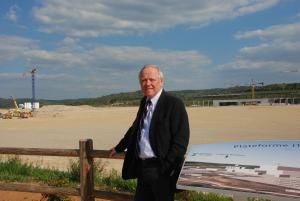My first 100 days
22 Apr 2011
-
Rem Haange, ITER Deputy Director-General, Department for ITER Project
"Building ITER will require a continuous and joint effort involving all players. Then, in the end, I am convinced we will succeed!"
My charge as Head of the Department for ITER Project is to oversee the acquisition of ITER's main components and systems that are manufactured and produced in the seven Member states, to guarantee their timely delivery and assembly, and finally to ensure their successful commissioning.
During my first 100 days in this new role I began by looking at the facts and figures, and I came to the conclusion that things need to change quickly and drastically if we want to get the project back on track. We are reviewing, on a monthly basis, where we are with respect to the ITER Project schedule and, in a concerted effort with the Domestic Agencies, we have developed strategies to catch up lost time where necessary. These strategies will be presented to the Management Advisory Committee next month.
The main and most urgent issue is to increase the overall efficiency of the ITER Organization. Too often in the past, we were unsuccessful in delivering the designs for the major components to the Domestic Agencies on time, which prevented the start of the procurement process. Delays to the overall project schedule—something that is inacceptable—were thus in a sense "preprogrammed."
Our activities to restructure and redefine the processes within the Organization are taking place against the backdrop of a very difficult financial situation. The project's tight budget for this year and next forces us to look at every bolt or nut and to decide whether we can postpone its procurement to a later stage, or whether we need it at all. At the same time, we are focusing our forces to push for the finalization of the designs.
During the past weeks we performed a very comprehensive exercise to further explore our options for achieving the technical scope of ITER with less money. As you know, the ITER Council last year capped the construction costs for the project at approximately EUR 12 billion (the actual cap is defined in "ITER Units of Account (IUA)" and its conversion rate into euros depends on the cost of fabrication in the Member states), a target that will be extremely hard to meet. But we must be aware that there is no alternative: The given price tag is not negotiable.
ITER, without question, is a very complex project and as we proceed we will face many more problems—small, large, and even overwhelming at first sight—that we will need to overcome. But from my previous experience (e.g., in building the Wendelstein W 7-X Stellarator) with all its ups and downs, I know that it is feasible. Building ITER will require a continuous and joint effort involving all players. Then, in the end, I am convinced we will succeed! Up to then this will remain a challenging task and for most of us a once-in-a-lifetime opportunity to contribute to such a fantastic endeavour.


